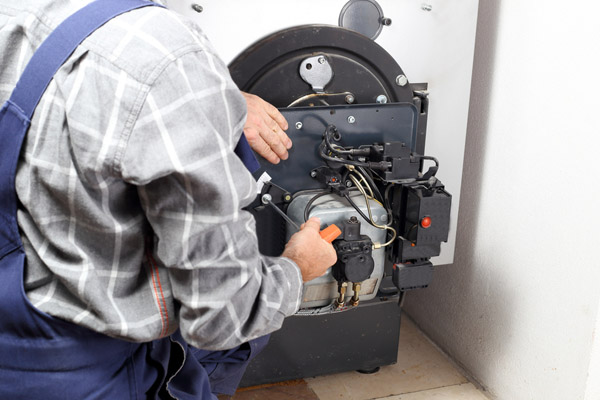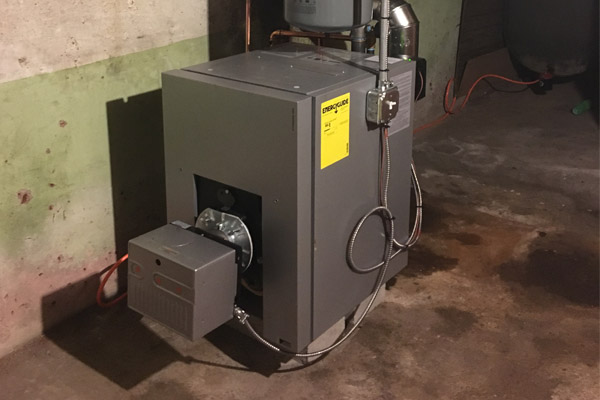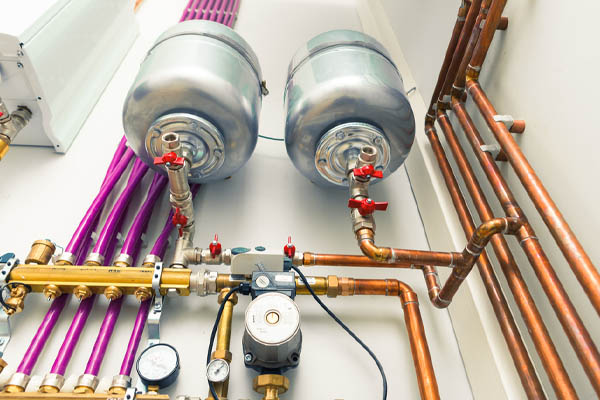How Does An Oil Heating System Work?

Oil-powered heating systems are eco-friendly and boast a lifespan that’s double that of systems using alternative fuel sources. Opting for an oil heating system is a wise choice for your residence due to its cost-effectiveness and remarkable efficiency, particularly the latest models with notable AFUE ratings. Read on as we explore how your oil heating system works.
First, let’s address some common myths surrounding oil heating systems.
Common Myths About Oil Heating Systems
Contents
- Environmental Concerns: There’s a common notion that heating oil doesn’t combust as cleanly as its counterparts. It’s important to note that this is not the case. Thanks to modern technology in the equipment, fuel oil meets and often exceeds the air quality standards set by the Environmental Protection Agency (EPA). This positions oil heating systems as a prime choice for those prioritizing environmental care.
- Cost-Effectiveness: The initial outlay for oil heating systems might seem higher, but their longevity makes them a wise financial choice. You can reduce fuel expenses by 5% by choosing an oil heater.
- Durability: While propane and natural gas systems have a lifespan of 11 to 14 years, oil heating systems surpass them by enduring an additional 30 years.
- Safety: Some might believe that heating oil poses safety risks, but this is far from the truth. Comparable to diesel in its innate form, heating oil, when stored appropriately, eliminates any explosion hazards, providing peace of mind.
Understanding Oil Heat Functionality
Oil heating systems employ three primary methods to heat your residence: through vents, baseboards, or radiators. When learning how your oil heating system works, you’ll learn that the process begins when the thermostat detects a temperature drop below a set point, prompting the heater to activate and commence the heating process.
As the oil warms up, it’s pumped from the storage tank to the burner. Here, it transforms into a fine mist that combines with air. This mixture of fuel and air then enters the burner, leading to the ignition of flames within the combustion chamber.
The oil either warms the air or water, depending on the heating method your residence has. Systems using air-based heating are commonly known as central forced-air systems. They utilize ductwork and vents to distribute the heated air uniformly. On the other hand, water-based systems, often called hydronic heating systems, circulate heated water to radiators or baseboards, contingent on your home’s configuration.
You have two primary options when it comes to heating oil systems: Select either a furnace or a boiler. While there are distinctions between the two, a shared trait is their heightened efficiency in newer models. As highlighted earlier, HVAC technology advancements prioritize producing remarkably energy-efficient heating solutions.
Oil-Heat Furnaces

Contemporary furnaces with minimum efficiency outperform and operate more proficiently than their older atmospheric counterparts. A fan channels the exhaust air across a heat exchanger.
Utilizing oil for heating a furnace, the top choices are the recent condensing models. When exploring how your oil heating system works, you’ll learn that these systems are designed to retain more heat, reducing what’s lost to the surroundings. Instead of immediately releasing the hot exhaust, these furnaces cool down the gases first. This action causes water vapor to condense, after which the exhaust is directed outside via a side-mounted plastic pipe.
Oil-Powered Boilers
When learning how your oil heating system works, you’ll understand that these boilers heat water, which then circulates throughout the home, delivering warmth via radiators or baseboards. Once cooled, the liquid returns to the boiler for reheating.
An alternative heating oil system is the steam boiler. While rarer, its mechanism involves boiling water, producing steam that then circulates and delivers warmth via radiators.
Difference Between A Furnace and Boiler

The fundamental distinction between furnaces and boilers lies in their medium: furnaces utilize air, while boilers employ water to heat your space. This mirrors how the heated oil maintains system warmth, allowing for the continuous cycling of cool air or water back into the system for reheating.
Both furnaces and boilers rely on oil for heating. When exploring how your oil heating system works, you’ll see that the process starts in the combustion chamber, where the oil ignites into flames. Subsequently, the heat exchanger transfers this warmth to the gases or water coursing through the system.
Maintaining Your Oil Heating System
Just as with other heating systems, the oil heating system necessitates regular upkeep to guarantee optimal and efficient operation. A key step is cleaning your thermostat before the onset of the heating season, as it plays a pivotal role in controlling your home’s temperature.
Maintaining the blower and stack components of your oil heating system is crucial. These parts oversee the burner’s operation. Regular maintenance assists in eliminating particles and assorted debris that could impede your heater’s functionality.
While certain tasks are within your capability, it’s always beneficial to enlist a professional’s expertise and ensure all is in order before winter arrives. If you’ve yet to do so, arrange for HVAC services promptly. An annual cleaning can enhance your heating system’s efficiency, lower heating expenses, boost indoor air quality, and elevate overall comfort.
Environmental Advantages of Utilizing Oil Heating Systems

Oil heating systems generate clean heat, with modern models emitting nearly negligible smoke and combustion residues either inside your residence or into the atmosphere. As affirmed by the EPA, oil burners rank among the top sources for clean combustion.
Storing oil tanks poses no risk to your health or the environment, and with proper maintenance, these tanks can endure for several decades. Importantly, heating oil is non-toxic, free from carcinogens, and fully biodegradable.
Opting for an oil heater system offers economic advantages and longevity and contributes positively to the environment. These systems are designed to release minimal smoke or particles, making them a conscientious choice for your wallet and the planet.
In Summary
For those contemplating a new heating solution, understanding the merits and mechanics of an oil heating system is pivotal when exploring how your oil heating system works. Modern models prioritize environmental wellness and prove to be cost-efficient over time.
Before the chill of winter sets in, it’s crucial to have a professional assess your heating system to ensure its optimal performance. Relying on a skilled HVAC contractor can provide peace of mind, ensuring your system remains reliable during the coldest times. Don’t hesitate to arrange a cleaning session for your heating system today!
Call Miller Oil Company For Your Home Heating Requirements

At Miller Oil Company, we take pride in delivering top-tier heating and cooling services to our community. Our team comprises highly skilled and certified technicians who provide exceptional HVAC tune-ups, repairs, installations, and replacements.
We offer the most competitive pricing for HVAC services in the region. If you need an HVAC replacement system, we can recommend the ideal solution for your home while sticking to your budgetary constraints. Our unwavering focus remains on enhancing energy efficiency, comfort, indoor air quality, and more. To arrange an appointment, please don’t hesitate to contact Miller Oil Company today and take advantage of our complimentary in-home estimate.
To schedule a service appointment, contact Miller Oil Company today. We also offer free, in-home estimates. Click the link to view our service area.
Related Articles: